Russia's reliance on China is growing, but will China benefit?
The outside world predicts that China and Russia are set to demonstrate a "no limits" relationship and join hands to counteract the US and its Western alliance. However, China seems to be gaining dominance in China-Russia relations as Moscow is trying to strengthen its already deep economic, military and energy cooperation with Beijing. Lianhe Zaobao's China Desk and journalist Miao Zong-Han tell us more.
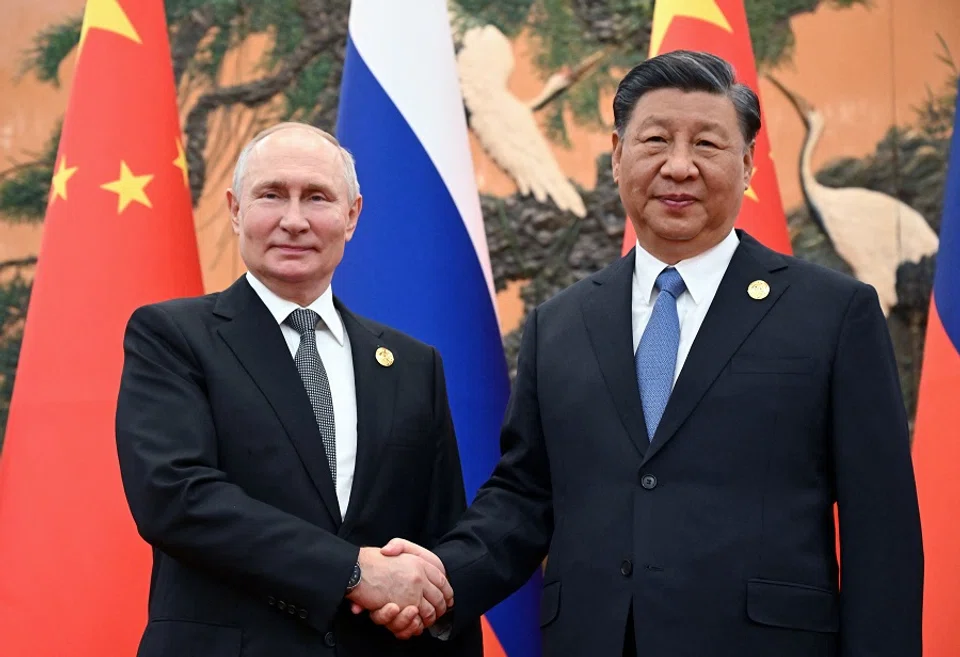
Marking the tenth anniversary of the Belt and Road Initiative (BRI), China welcomed representatives of some 130 countries to the Belt and Road Forum, with the most talked-about guest being Russian President Vladimir Putin, who had arrived in China a day before the opening ceremony of the forum held on 18 October.
'Polite and courteous' Xi-Putin meeting
During the bilateral meeting between Chinese President Xi Jinping and Putin on 18 October, Xi noted that since their meeting in Moscow in March, mutual trust between both countries has been deepening and strategic cooperation has been intimate and effective.
Both Xi and Putin highlighted that bilateral trade has hit a record high and is on track to reach the set target of US$200 billion.
Xi also pointed out that Russia is an "important partner" of China in Belt and Road international cooperation, and hopes that the China-Mongolia-Russia natural gas pipeline will achieve substantive progress soon. He added that both sides will also pursue high-quality practical cooperation, and actively explore cooperation in emerging industries of strategic importance.
The Chinese leader also expressed China's support of Russia's hosting of the BRICS summit in Kazan next year, and that it is prepared to work with Russia to enhance communication and coordination within multilateral frameworks such as the United Nations, the Shanghai Cooperation Organisation and G20, to play a greater role in ensuring food security, energy security and stable global industrial and supply chains, and to uphold the shared interests of both countries, the region and the developing world.
Putin stressed that amid the current difficult conditions, close foreign policy coordination with China is crucial.
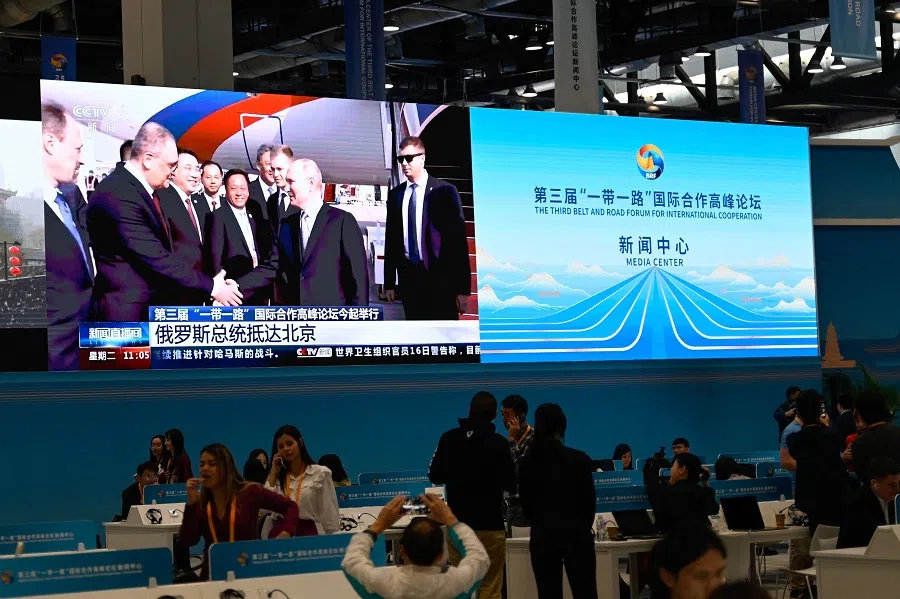
Meanwhile, Putin stressed that amid the current difficult conditions, close foreign policy coordination with China is crucial.
At a press conference with Russian media after the meeting, Putin said that both sides had spoken for three hours and discussed bilateral relations as well as the situation in the Middle East and Ukraine. He stressed that external factors were common threats to China and Russia, and would strengthen bilateral cooperation.
Putin also added that the Russian and Chinese prime ministers are set to sign a plan for China-Russia interaction until 2030 in Bishkek.
This is Putin's second trip abroad, and first trip outside of the former Soviet Union, since the International Criminal Court (ICC) issued an arrest warrant for him in March over war crimes. Earlier this month, he visited Kyrgyzstan, a former Soviet republic. China is not obligated to arrest Putin because it did not sign the ICC's treaty.
Putin accepted invitations to visit Thailand and Vietnam on 18 October, according to government statements from the two Southeast Asian countries. However, a date has yet to be set.
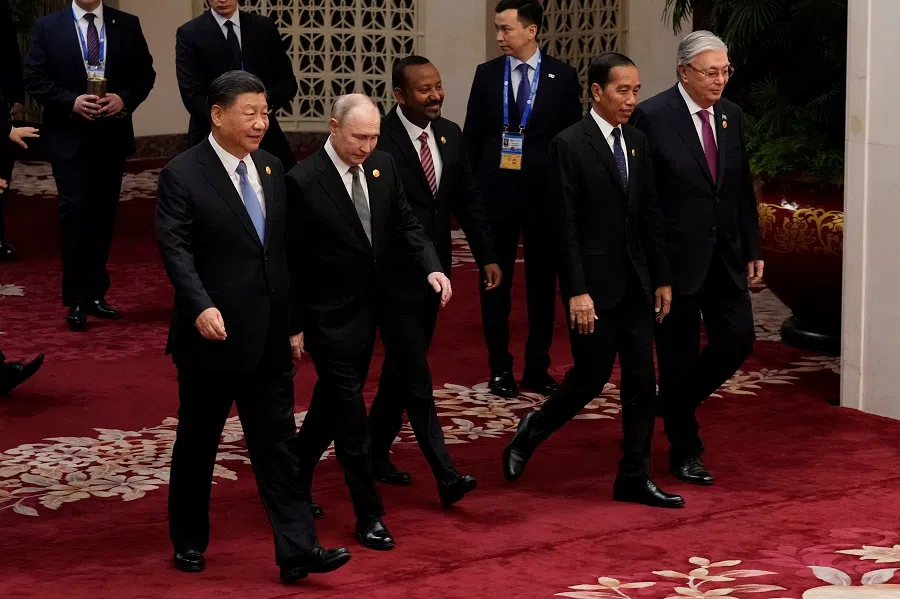
Lu Yeh-Chung, vice-dean of the College of International Affairs at Taiwan's National Chengchi University, told Lianhe Zaobao that amid the Russia-Ukraine war and Israel-Hamas conflict, the Chinese and Russian leaders have interacted in a "polite and courteous" manner. But Putin could capitalise on this trip to China as a launching pad for his return to the international stage after the Russia-Ukraine war.
China and Russia joining hands?
Despite domestic pressure on Putin as the Russia-Ukraine war drags on and China's economic slowdown, and amid turmoil in the Middle East and geopolitical risks due to the Israel-Hamas conflict, the outside world has been predicting that China and Russia would demonstrate a "no limits" relationship and join hands to counteract the US and its Western alliance during this major diplomatic occasion.
The South China Morning Post reported on 17 October that the Israel-Hamas conflict has highlighted intensifying divisions among various camps around the world. On the one hand, the global south, sympathetic to Palestinians, is aligned with China and Russia; on the other hand, the US seeks support for Israel.
For Putin, the trip to Beijing is a chance to show that Russia has the support of a major power after the war in Ukraine led to its growing isolation. It is just that China is becoming increasingly dominant in China-Russia relations.
... Putin's high praise of China is related to its growing reliance on China after suffering severe sanctions from the West over its invasion of Ukraine.
Russia's growing strategic reliance on China
In an interview with China's CGTN before his departure for Beijing, Putin praised Chinese President Xi Jinping as "one of the recognised world leaders" and stressed that Xi is not a leader who makes momentary decisions on the basis of some current situation, but assesses the situation, analyses it and looks into the future.
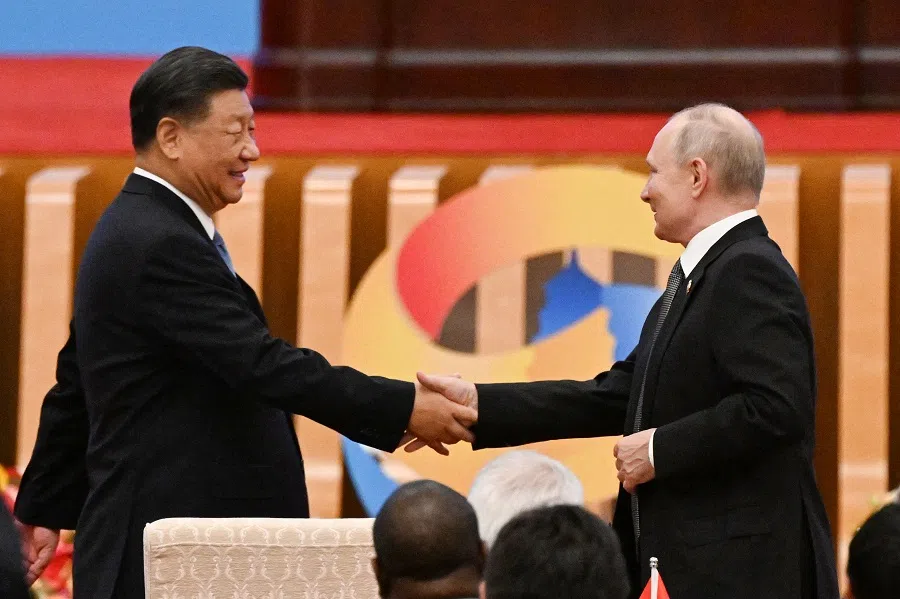
Putin added, "This is exactly what distinguishes a world leader from people whom we call 'time servers' who are there for a brief moment just to show off on the international stage, and then they are gone."
Putin's reference to "time servers" is believed to be taking a dig at some Western leaders. Analysts think that Putin's high praise of China is related to its growing reliance on China after suffering severe sanctions from the West over its invasion of Ukraine.
Agence France-Presse (AFP) reported that Moscow has been trying to strengthen its already deep economic, military and energy cooperation with Beijing, illustrating that China is gaining dominance in their bilateral relations. Bjorn Alexander Duben, an international affairs expert at Jilin University, said that Moscow is unprecedentedly dependent on China, especially in the economic arena.
This year, China-Russia trade reached its highest level since the start of the war in Ukraine. Voice of America reported that China's purchase of Russian oil has provided a crucial lifeline to Moscow amid the onslaught of international sanctions. Based on data from China's General Administration of Customs, Financial Times reported that in the first half of 2023, China imported 11.4 million barrels of crude oil per day, up 11.7% year-on-year and up 15.3% compared with pre-pandemic levels. Last year, bilateral trade between both countries also reached a record US$190 billion.
Russia's finance minister Anton Siluanov emphasised the country's reliance on China for the supply of drones, stating that "today, almost all drones are from China".
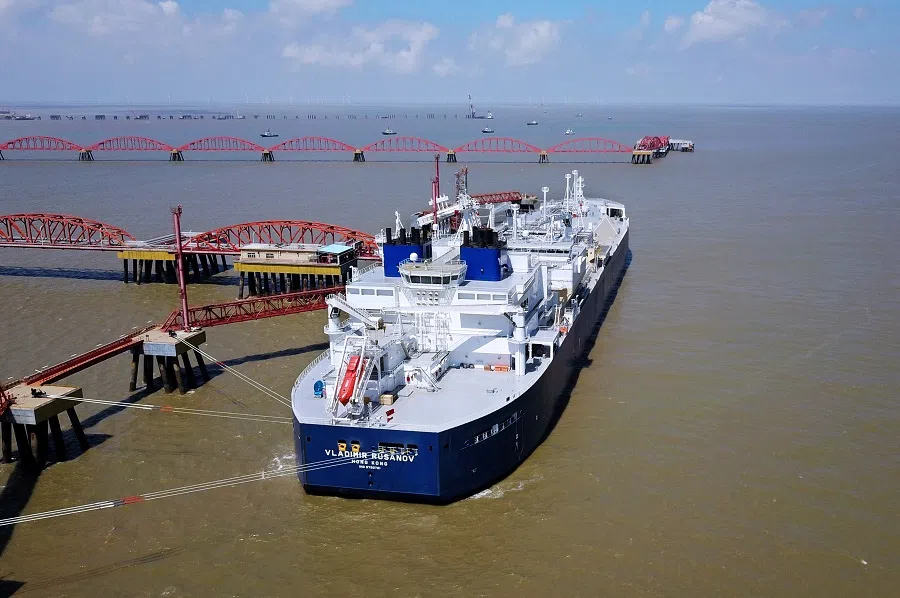
China's exports to Russia have jumped 57% so far this year. According to data compiled by Bloomberg Economics, the RMB accounted for nearly half of the total value of foreign exchange trading in Moscow in September, up from just 0.4% in January 2022. In addition, China is currently the largest importer of fossil fuels from Russia, with coal shipments more than doubling since 2020.
While Russia hopes to secure a deal to sell more natural gas to China and the heads of two Russian oil and gas giants have accompanied Putin on his trip to China, independent Russian analyst Konstantin Kalachev told AFP that there would be no further breakthroughs in natural gas deals during Putin's visit.
In the same report, Alexander Gabuev, director of the Carnegie Russia Eurasia Center, said that China does not want to sign any high publicity deals, and that "China holds all of the cards".
Atlantic Council Global Energy Center senior fellow Joseph Webster also told AFP, "Beijing has maintained a posture of 'pro-Russia neutrality' throughout the invasion, providing critical diplomatic, economic, and non-lethal military assistance to Moscow."
During a government meeting on 16 October, Russia's finance minister Anton Siluanov emphasised the country's reliance on China for the supply of drones, stating that "today, almost all drones are from China".
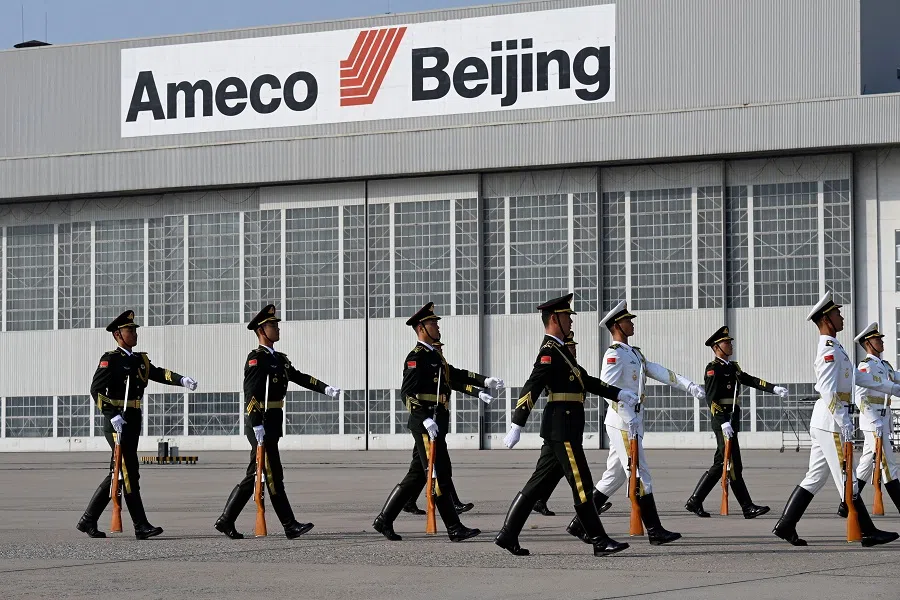
A Reuters report also quoted Siluanov as saying that Moscow would spend more than US$618 million on a national project to develop drone manufacturing.
China's Ministry of Commerce stated in April this year that China-manufactured drones were not exported to the Ukraine warzone, and criticised the US for "spreading false information with regard to China's export of drones, in a bid to smear the reputations of Chinese businesses". Since 1 September, China has imposed restrictions on the exports of civilian anti-drone systems, as well as specific drones and drone-related equipment.
The AFP quoted Alicja Bachulska, a policy fellow at the European Council on Foreign Relations, as saying, "China doesn't want to see a significantly weakened Russia, and it might step up its efforts if it comes to realise that Moscow might lose. Putin's regime collapse and related chaos are seen as a serious security threat."
How big a bet has China placed on Putin?
For China, Russia is not just a key source of oil and natural gas, but also a source for military technology. Al Jazeera reported that the People's Liberation Army (PLA) seeks to modernise its conventional and nuclear forces by 2035, and Russia as one of the world's biggest nuclear powers could share its technology. Russian aviation, rocket and even submarine technology have been shared with China over recent decades, according to a 2022 assessment by the US.
Moreover, China and Russia view each other as an indispensable ally in their collective tussle against Western dominance. A Bloomberg report stated that owing to longstanding mutual distrust of the West - especially the US and its military allies - and a desire to reinforce its own position on Taiwan, China is seeking out Russia to be a powerful partner in building its vision of an alternative world order.
Even as they offer handshakes with a smile on stage, off stage each side is wary.
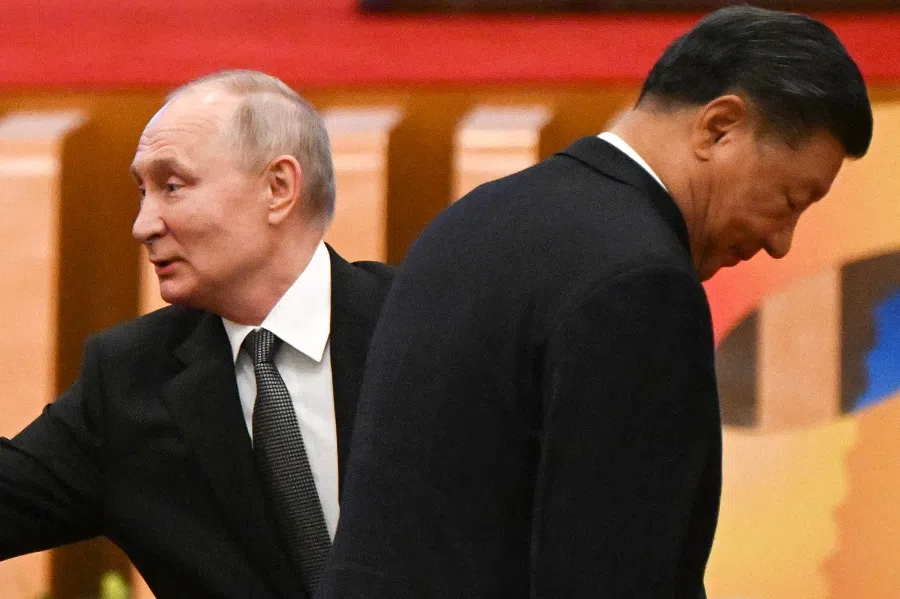
The report further said that if the PLA were to attack Taiwan, Russia could prove crucial in ensuring supplies of food and fuel and potentially providing political cover at the United Nations Security Council.
However, the report also stated that some experts and academics in Beijing felt that China is getting little from the relationship beyond a new market for some of its locally-made products and lower prices for Russian oil and natural gas. Jakub Jakobowski, deputy director at the Centre for Eastern Studies in Warsaw, stated, "[Putin is] increasingly a burden of Xi internally for those parts of the Chinese elite that don't want to subscribe to this big affair that Russia has started." Moreover, a source of tension in the bilateral relationship has been the expansion of China's influence in Central Asia through the BRI, a region in Russia's traditional backyard.
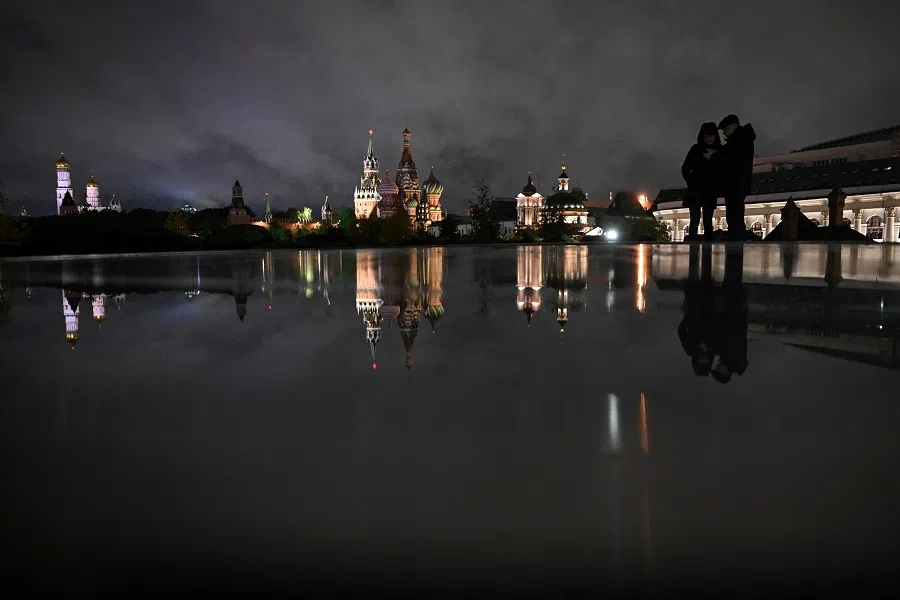
Sun Yun, co-director of the East Asia Program at US think tank Stimson Center, added that Beijing cannot press its advantage too hard. She added that Russia's current strategic quagmire will not last forever, and that "for Beijing, the focus is not necessarily how much Russia is ready to give, but what costs China has to carry".
Each big country has their own grand scheme to secure their personal interests: how much cost it should shoulder and how big of a price it should pay, are all areas they have considered.
Even as they offer handshakes with a smile on stage, off stage each side is wary. It is natural for each to take what it needs - needs outweigh relations, and is but a manifestation of pragmatic diplomacy.
This article was first published in Lianhe Zaobao as "中俄相互借力各取所需?", and includes updates from 习近平普京年内二度会面 强调两国协作协调.






